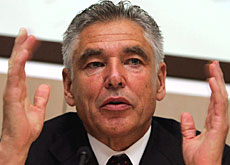Food giant bets on healthy metabolism

Swiss multinational Nestlé has unveiled plans to tailor diets to the health needs of each individual.
Researchers are hoping that by recommending an appropriate diet, consumers will be able to delay or prevent some diseases and generally have a healthier life.
Metabolic diseases, heart disease, obesity, diabetes, osteoporosis and hypertension are slowly becoming major health issues all around the world.
According to scientists who gathered recently at Nestlé’s research centre above Lausanne, most of these problems have the same cause: metabolic dysregulation or imbalance.
But the researchers say the extent of the imbalance varies from individual to individual.
Health issue
The pharmaceutical industry has tried to develop tailored drugs. But results have shown new products work on some people and not on others.
Nestlé, the world’s biggest food company, has decided to tackle the other end of the equation.
“Diet is a health issue around the world, and Nestlé is a part of the problem so it could also be part of the solution,” said one of the company’s senior science advisors, Bruce German.
The multinational has already made a public commitment to developing tailored foods, adding that its future lies in nutrition, health and wellbeing.
Personal map
But German admits that Nestlé is stepping out into uncharted territory. “The company doesn’t know what the business model will be, and it will have to figure out how to incorporate added value into its products,” he told swissinfo.
So-called functional foods were the industry’s first foray into the health field.
“They are in essence the best way now for a food to deliver functionality,” said German. “But this relies on the consumer knowing what they need and is targeted at everyone, with a few exceptions such as cholesterol-lowering products.”
Researchers are in the driver’s seat as regards metabolics. Their first step will be to bring together information that has been disseminated far and wide.
“Science will then have to develop a map for each of us,” added German. This map will help tailor an individual’s nutritional requirements.
Choice
The result will not be factories making food for each person. Rather, individual data will allow a person to make choices, within limits, about what he or she eats.
“People know the tastes they like, but they don’t know what is good for them in terms of nutrition and health,” German told swissinfo.
It will not be a case of a multinational deciding what is good for you either.
“We are only talking about recommendations at the end of the day, rather like those for sexual behaviour or smoking,” said Günter Blobel, Nobel Prize winner and Nestlé board member designate.
“People still have the choice to eat what they want.”
Blobel told swissinfo that the food industry doesn’t influence choice as much as some people think.
“Most of the food we eat is not made by industry,” he added. “It’s only a small percentage targeted at people who don’t have time to prepare their own meals.”
Wealthy beneficiaries
Researchers say that the basic technology required to measure metabolism exists to create a database. But once the data is collected, its application could be problematic.
“The extent of information is far more than a normal person can handle, so there will have to be experts or computerised systems to give advice,” added German.
There are also fears that this knowledge may only be applied to wealthy Westerners, a problem scientists are well aware of.
“Socio-economic class is a huge issue,” said Michael Gibney of Trinity College in Dublin. “Society has to ensure the system is fair to everyone.”
Nestlé admits the wealthier social groups will benefit first from the knowledge garnered, but it hopes that will be applied around the world later on.
“The technologies we are considering are consistent with a well-developed social, cultural and health system, but they are not inherently expensive,” German told swissinfo.
“We can imagine that areas in the world without proper health infrastructure could among the greatest beneficiaries of future developments.”
swissinfo, Scott Capper
Nestlé sales at the end of 2003 were SFr88 billion, with a net profit of SFr6.2 billion.
The company employs around 253,000 people.
Nestlé’s main research centre is based above Lausanne.
Metabolism is the sum of the chemical reactions that take place within each cell of a living organism and that provide energy for vital processes and for synthesizing new organic material.
Organic molecules involved in these processes are called metabolites.
The transformation of one molecule into another, and then into another and another in sequence, is termed a metabolic pathway.
Exercise, food, and environmental temperature all influence metabolism.

In compliance with the JTI standards
More: SWI swissinfo.ch certified by the Journalism Trust Initiative




You can find an overview of ongoing debates with our journalists here. Please join us!
If you want to start a conversation about a topic raised in this article or want to report factual errors, email us at english@swissinfo.ch.